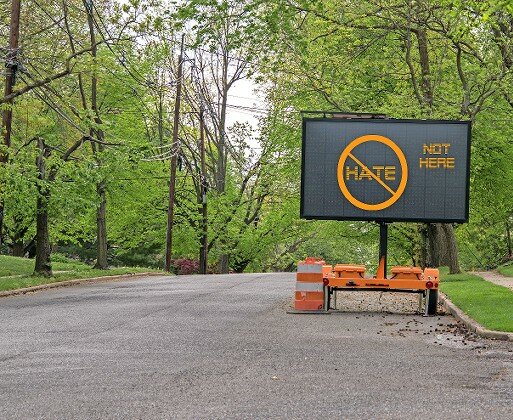To stop Jew-menacing hate, colleges must follow 4 rules
American universities have a history of dealing with campus unrest by waiting for their students to go home for break and hoping they return in a better mood. After a fall semester defined by tensions over the war between Israel and Hamas, and a resulting surge in antisemitism, such wishful thinking is not a viable strategy as classes resume for the spring semester and war continues to rage in Gaza.
The stakes are too high, what has been seen cannot be unseen, and world events may magnify tensions even more.
The problems on college campuses don’t require a “cooling off” period over winter break. They require university leaders to do better.
Jewish students, parents and community leaders want to see higher education thrive and universities re-emerge as places that challenge students intellectually without endangering them physically or emotionally.
As war continues to rage in the Gaza Strip, that means university leaders must properly understand antisemitism, Zionism, national politics and how free speech operates within a democracy. Going further, that also means spreading their collective wings from an intellectual perspective — and returning to fundamentals from a moral one.
Here are four guiding principles that university leaders should embrace this semester. They represent a more thoughtful strategy than wishful thinking.
1. Stop debating what ‘antisemitism’ is.
Antisemitism in Jew-hatred. Let’s call it that.
The term “Antisemitismus” was coined in Germany in 1879 to give a respectable, scientific air to blaming Jewish people for economic and political injustice, and accusing them of double loyalties. It deliberately presented an alternative to the more commonly used, but less respectable, Judenhass, or “Jew-hatred.”
No matter what it’s called, hate does not belong on college campuses, regardless of what students or faculty think about Israel’s policies or the humanitarian crisis in Gaza.
The hate is real. A plurality of Jewish students said in November they do not feel safe on their campuses.
•Last semester, some students had to seclude themselves in dorms and libraries for safety.
•Some were physically assaulted or cornered.
•Hillel Jewish centers were vandalized.
•Chanukah menorahs were defaced.
After Oct. 7, we saw anti-Zionists who want to deny the Jewish people’s right to self-determination in their ancestral homeland use that “political” view as a guise for the very worst of Western traditions: targeting Jews.
Spending any more time debating the definition of this hate is a dangerous distraction from fighting it.
2. Don’t let hate become a political wedge issue.
When the presidents of Harvard, Penn and MIT fumbled their way through evasive answers about Jew-hatred on campus, the ensuing discussion should have focused on issues of morality, ethics, safety and legal rights. But since the setting was the US Capitol, much of the talk was about politics.
From Saturday Night Live to faculty lounges and Boards of Trustees, many were quick to frame the hearing as Republicans attacking higher education — conveniently ignoring the outrage from many Democrats — or as progressive campus leaders standing up to partisan bullies. (A similar narrative also framed Harvard president Claudine Gay’s resignation amid allegations of plagiarism.)
The conversation after the congressional hearings missed the point that Jew-hatred can come from every quarter and should never be normalized as part of a political debate.
If Jew-hatred is just another political prop in America’s culture wars, it will never be addressed.
3. Recognize when free speech creates a hostile environment … for all groups.
During their congressional testimony, the presidents would not clearly answer a simple moral question: Is it OK to issue calls for genocide?
The answer is no, and always has been.
First Amendment protections provide no safe harbor for those who call for genocide or glorify terrorism. The legal underpinning of this truth is Title VI of the 1964 the Civil Rights Act, which limits speech in specific and limited instances when it constitutes harassment or discrimination.
•The US Department of Education gets this: It has launched an investigation of multiple campuses for creating a hostile environment for Jewish and Muslim students.
•Campus leaders sometimes get this: They have implemented codes of conduct that prohibit verbal harassment and have repeatedly condemned community members who voice racist homophobic, transphobic or Islamophobic views.
This spring they must apply the same standards to protect Jewish students and implement existing policies that hold their community accountable.
4. Recommit to intellectual diversity.
On too many campuses, the default worldview now holds that race and power are the primary means through which we should understand the past and present. This worldview looks to Israel (and America) and sees nothing but a colonial foundation of racism, exploitation and stolen land.
Such postcolonial scholarship dehumanizes Jews and delegitimizes Israel.
Students must be taught to understand this may be a lens but is not the lens through which we look at the world. They need to recognize that history is far more messy and complicated than many critical theorists suggest it is.
Doing so requires academia to spread its intellectual wings — or at least not to get in the way of those who wish to do so.
It also means having the bravery to accept that academic integrity requires moral clarity. Rape, murder and hostage-taking are not “forms of resistance” against Jewish oppressors, as we heard on so many college campuses after Oct. 7.
They are evil.
The present call to reject antisemitism is therefore ultimately a call to recommit to universal human values.

 46.0°,
A Few Clouds
46.0°,
A Few Clouds 





